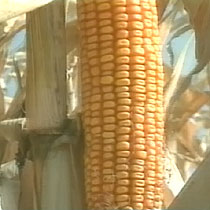2007年VOA标准英语-Ethanol Production Poised to Surge in US
搜索关注在线英语听力室公众号:tingroom,领取免费英语资料大礼包。
(单词翻译)
By Brian WagnerMiami
30 March 2007
President Bush has set ambitious goals to reduce the country's dependence1 on oil, and increase the use of alternative fuels like ethanol. VOA's Brian Wagner reports from Miami that experts are now at work to ensure there will be enough new supplies of ethanol to meet the demand.
A recent deal between the United States and Brazil to share ethanol technology marked a key step to expand the American market for alternative fuels. Brazil has built a strong local market for ethanol based on local sugar production, and U.S. officials are hoping to learn some lessons from its success.
 |
| U.S. ethanol is made from corn |
"The president's goal has begun to shake up the energy sector2," says Brian Dean, head of the Interamerican Ethanol Commission. "That's not just ambitious, it's audacious. We're going to start seeing policy initiatives immediately, I think. And with those policies, consideration needs to be given to our ability to create enough products to meet these very ambitious objectives of 35 billion (gallons). The United States only produced a little over five billion gallons last year, it consumed close to six billion. We're talking about a five-fold increase."
The United States is already looking for additional partners in Latin America to expand the ethanol sector. However, current U.S. policies restrict imports of ethanol and crops from the region, mainly because of pressure by U.S. farmers concerned about losing market share.
Dean says the supply of ethanol from corn and other domestic farm crops will not be enough to meet the Mr. Bush's goals. "But clearly, corn alone, sugar cane3 alone, or any single feedstock that is agricultural is not going to be able to satisfy the market," he notes. "Clearly the future of ethanol lies in a holistic4 approach that contemplates5 agricultural sources, but also the cellulosic technologies. There needs to be an expansive view of ethanol."
Cellulosic ethanol is derived6 from biomass or plant waste, such as bagasse from sugar cane. Experts are still working to improve the process. But within a few years, it could expand the market place for fuels, says George Philippidis, associate director of the Applied7 Resarch Center at Florida International University.
"Where depending on what kind of raw material you have in each part of the country or the world, the [processing] plant will feed on that," he explains. " For instance, south Florida is very rich in bagasse [sugarcane waste]. Central Florida has a lot of citrus peel."
Philippidis says the technology to make ethanol from such waste products is still a few years away. But he says it will be needed to reduce demand for corn, sugar, and other farm products. Already, the rising interest in ethanol has been blamed for a jump in prices for corn tortillas in Mexico.
Philippidis says we can expect to see more market fluctuations8.
"The free market operates that way. We're going to see the ups and downs until we have a demand and supply that are in sync. But that doesn't scare me, it doesn't concern me. That's a natural cycle that the market is going to go through," he says.
Experts say the move away from an oil-based energy market will help reduce pollution and increase energy security. But, as long as demand for ethanol remains9 high, consumers should expect not to see much savings10 at the gas pump.




